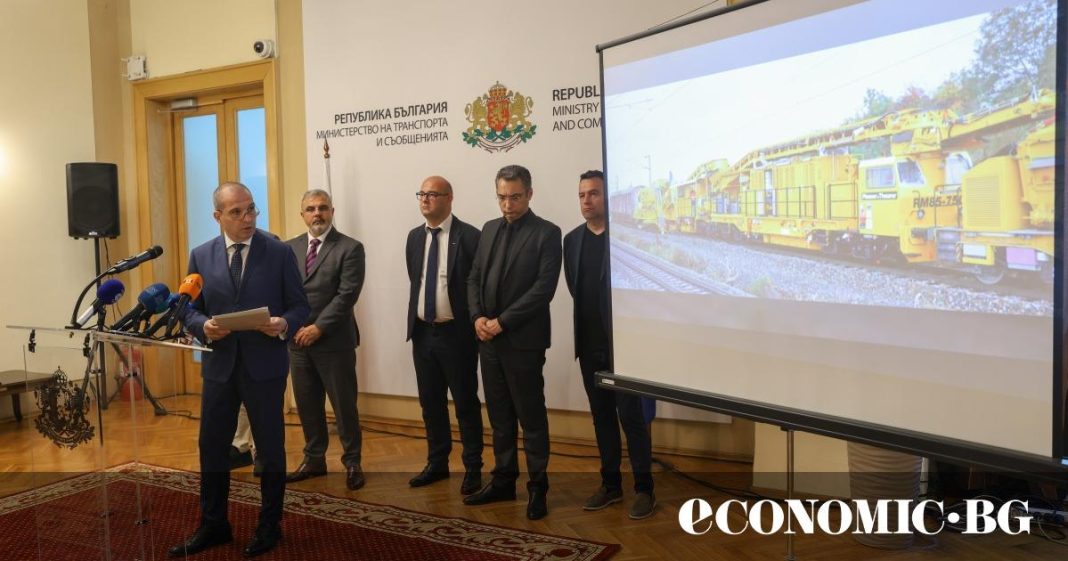The Bulgarian railway sector has received a significant boost after the European Commission approved changes to the Recovery and Resilience Plan (RRP), providing an additional BGN 517 million. This was announced by Transport Minister Grozdan Karadzhov, quoted by BTA. According to him, the Ministry of Transport is the main beneficiary of these funds, which is “a clear sign of the EC’s confidence in the reforms undertaken in the railway transport sector.”
Of these additional funds, BGN 357 million will go to two projects of the National Railway Infrastructure Company (NRIC), and the remaining BGN 160 million to one project of the Bulgarian State Railways (BDZ). All these investments are already underway and should be completed by August 2026.
New trains for BDZ
An additional BGN 160 million is being provided for new rolling stock. These funds will support the purchase of the already contracted 25 multiple units from Skoda and 35 new multiple units from Alstom. The first new trains are expected to arrive in the country in the summer of 2026.
Modernization of infrastructure and machinery
Approximately BGN 195 million has been allocated for the acquisition of modern specialized machinery for the National Railway Infrastructure Company (NRIC). 40 new machines, 4 specialized wagons, and 2 modifications will be purchased. The machines are expected to arrive by March 2026, as the order for them has long been placed and finalized. The expected benefits include shorter repair times, less manual labor, increased capacity for infrastructure renewal, and improved safety.
Another BGN 162 million will be allocated to the modernization of over 52 km of railway sections and stations along the main TEN-T corridors. The main focus is on the Ruse-Kaspichan line, where trains currently run at only 20-30 km/h.
Stations such as Hitrino, Pliska, and Razgrad will also be modernized, as well as the key station of Svoge on the Sofia-Mezdra line. In Svoge, the tracks and contact network will be completely reconstructed and a new route-computer centralization system will be built, which will contribute to higher service quality and passenger safety. These activities should be completed by the end of 2025.
Non-functioning air conditioners – crisis team
Non-functioning air conditioners on trains are once again on the agenda, with the situation reaching the point where the minister has formed a crisis team and threatened the railway management with dismissal if an immediate solution to the problem is not found.
The reason for the sharp reaction was yesterday’s report of a train on the Sofia-Burgas line, where high temperatures in a carriage without working air conditioning and the inability to open the windows endangered the lives of passengers. The problem mainly affects second-hand carriages purchased from Deutsche Bahn, which, although they depart with working air conditioning, stop on the Sofia-Burgas, Sofia-Varna and Sofia-Ruse lines.
Minister Karadzhov expressed his bewilderment at the fact that BDZ engineers are unable to determine the technical reason for the air conditioning failure and why it cannot be restarted while the train is in motion. Urgent measures have therefore been taken. As a temporary solution, an additional carriage with opening windows will be added to the affected trains, with carriages being diverted from shorter and less busy lines such as Vetovo – Senovo, Hisarya – Dolna Mahala, and Levski – Troyan, where air-conditioned buses will be provided.
In addition, the entire management of BDZ – Passenger Transport has received a “yellow card.” The minister ordered representatives of the management to travel on each of the problematic trains, accompanied by a technician, to try to repair the faults while the trains are in motion.
In case of a problem, passengers will be transferred to the reserve car. Regarding the technical aspect, Karadzhov explained that the Deutsche Bahn cars operate at 1,000 volts, while the Bulgarian network is 1,500 volts, which is the reason for the problems.
Specialists from the German company have been called in with the hope that they will find a permanent solution. The minister did not hide his disappointment with the purchase, describing the carriages as cheap and reliable at first glance, but causing unforeseen difficulties.
The problems with the railways are not limited to air conditioning. Karadzhov announced that reports of poor cleanliness in the carriages and rude treatment of passengers continue to be received, which is why another crisis team has been set up to deal with these irregularities.
Problems with comfort and hygiene on BDZ trains are long-standing and well known to passengers. Last summer (2024), the carriages purchased from Deutsche Bahn for over BGN 30.4 million failed to provide a comfortable journey, with the excuse given at the time being the “heatwave.” It turned out that these carriages were not suitable for “intensive” use and needed maintenance every 12,000 km, which meant they had to be taken out of service in the middle of the season and old trains brought back into service.
Prior to the current problems, in response to a parliamentary question, Minister Karadzhov had presented a series of measures taken for a “peaceful summer 2025.” These included the provision of refrigerant (freon), maintenance and preventive maintenance contracts for the air conditioning systems of 20 carriages, and key training from Deutsche Bahn for BDZ technical and maintenance staff. A planned maintenance warning system was also introduced, including regular preventive maintenance twice a year.
Translated with DeepL.
Източник: Economic.bg


